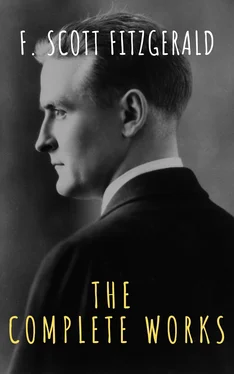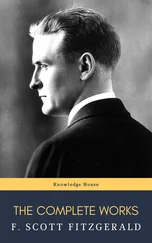Past the low Corinthian lines of the Christian Science Temple, past a block of dark frame horrors, a deserted row of grim red brick—an unfortunate experiment of the late 90’s—then new houses again, bright-red brick now, with trimmings of white, black iron fences and hedges binding flowery lawns. These swept by, faded, passed, enjoying their moment of grandeur; then waiting there in the moonlight to be outmoded as had the frame, cupolaed mansions of lower town and the brownstone piles of older Crest Avenue in their turn.
The roofs lowered suddenly, the lots narrowed, the houses shrank up in size and shaded off into bungalows. These held the street for the last mile, to the bend in the river which terminated the prideful avenue at the statue of Chelsea Arbuthnot. Arbuthnot was the first governor—and almost the last of Anglo-Saxon blood.
All the way thus far Yanci had not spoken, absorbed still in the annoyance of the evening, yet soothed somehow by the fresh air of Northern November that rushed by them. She must take her fur coat out of storage next day, she thought.
“Where are we now?”
As they slowed down Scott looked up curiously at the pompous stone figure, clear in the crisp moonlight, with one hand on a book and the forefinger of the other pointing, as though with reproachful symbolism, directly at some construction work going on in the street.
“This is the end of Crest Avenue,” said Yanci, turning to him. “This is our show street.”
“A museum of American architectural failures.”
“What?”
“Nothing,” he murmured.
“I should have explained it to you. I forgot. We can go along the river boulevard if you’d like—or are you tired?”
Scott assured her that he was not tired—not in the least.
Entering the boulevard, the cement road twisted under darkling trees.
“The Mississippi—how little it means to you now!” said Scott suddenly.
“What?” Yanci looked around. “Oh, the river.”
“I guess it was once pretty important to your ancestors up here.”
“My ancestors weren’t up here then,” said Yanci with some dignity. “My ancestors were from Maryland. My father came out here when he left Yale.”
“Oh!” Scott was politely impressed.
“My mother was from here. My father came out here from Baltimore because of his health.”
“Oh!”
“Of course we belong here now, I suppose”—this with faint condescension—“as much as anywhere else.”
“Of course.”
“Except that I want to live in the East and I can’t persuade Father to,” she finished.
It was after one o’clock and the boulevard was almost deserted. Occasionally two yellow disks would top a rise ahead of them and take shape as a late-returning automobile. Except for that they were alone in a continual rushing dark. The moon had gone down.
“Next time the road goes near the river let’s stop and watch it,” he suggested.
Yanci smiled inwardly. This remark was obviously what one boy of her acquaintance had named an international petting cue, by which was meant a suggestion that aimed to create naturally a situation for a kiss. She considered the matter. As yet the man had made no particular impression on her. He was good-looking, apparently well-to-do and from New York. She had begun to like him during the dance, increasingly as the evening had drawn to a close; then the incident of her father’s appalling arrival had thrown cold water upon this tentative warmth; and now—it was November, and the night was cold. Still——
“All right,” she agreed suddenly.
The road divided; she swerved around and brought the car to a stop in an open place high above the river.
“Well?” she demanded in the deep quiet that followed the shutting off of the engine.
“Thanks.”
“Are you satisfied here?”
“Almost. Not quite.”
“Why not?”
“I’ll tell you in a minute,” he answered. “Why is your name Yanci?”
“It’s a family name.”
“It’s very pretty.” He repeated it several times caressingly. “Yanci—it has all the grace of Nancy, and yet it isn’t prim.”
“What’s your name?” she inquired.
“Scott.”
“Scott what?”
“Kimberly. Didn’t you know?”
“I wasn’t sure. Mrs. Rogers introduced you in such a mumble.”
There was a slight pause.
“Yanci,” he repeated; “beautiful Yanci, with her dark-blue eyes and her lazy soul. Do you know why I’m not quite satisfied, Yanci?”
“Why?”
Imperceptibly she had moved her face nearer until as she waited for an answer with her lips faintly apart he knew that in asking she had granted.
Without haste he bent his head forward and touched her lips.
He sighed, and both of them felt a sort of relief—relief from the embarrassment of playing up to what conventions of this sort of thing remained.
“Thanks,” he said as he had when she first stopped the car.
“Now are you satisfied?”
Her blue eyes regarded him unsmilingly in the darkness.
“After a fashion; of course, you can never say—definitely.”
Again he bent toward her, but she stooped and started the motor. It was late and Yanci was beginning to be tired. What purpose there was in the experiment was accomplished. He had had what he asked. If he liked it he would want more, and that put her one move ahead in the game which she felt she was beginning.
“I’m hungry,” she complained. “Let’s go down and eat.”
“Very well,” he acquiesced sadly. “Just when I was so enjoying—the Mississippi.”
“Do you think I’m beautiful?” she inquired almost plaintively as they backed out.
“What an absurd question!”
“But I like to hear people say so.”
“I was just about to—when you started the engine.”
Downtown in a deserted all-night lunch room they ate bacon and eggs. She was pale as ivory now. The night had drawn the lazy vitality and languid color out of her face. She encouraged him to talk to her of New York until he was beginning every sentence with, “Well, now, let’s see——”
The repast over, they drove home. Scott helped her put the car in the little garage, and just outside the front door she lent him her lips again for the faint brush of a kiss. Then she went in.
The long living room which ran the width of the small stucco house was reddened by a dying fire which had been high when Yanci left and now was faded to a steady undancing glow. She took a log from the fire box and threw it on the embers, then started as a voice came out of the half-darkness at the other end of the room.
“Back so soon?”
It was her father’s voice, not yet quite sober, but alert and intelligent.
“Yes. Went riding,” she answered shortly, sitting down in a wicker chair before the fire. “Then went down and had something to eat.”
“Oh!”
Her father left his place and moved to a chair nearer the fire, where he stretched himself out with a sigh. Glancing at him from the corner of her eye, for she was going to show an appropriate coldness, Yanci was fascinated by his complete recovery of dignity in the space of two hours. His greying hair was scarcely rumpled; his handsome face was ruddy as ever. Only his eyes, crisscrossed with tiny red lines, were evidence of his late dissipation.
“Have a good time?”
“Why should you care?” she answered rudely.
“Why shouldn’t I?”
“You didn’t seem to care earlier in the evening. I asked you to take two people home for me, and you weren’t able to drive your own car.”
“The deuce I wasn’t!” he protested. “I could have driven in—in a race in an arana, areaena. That Mrs. Rogers insisted that her young admirer should drive, so what could I do?”
Читать дальше












